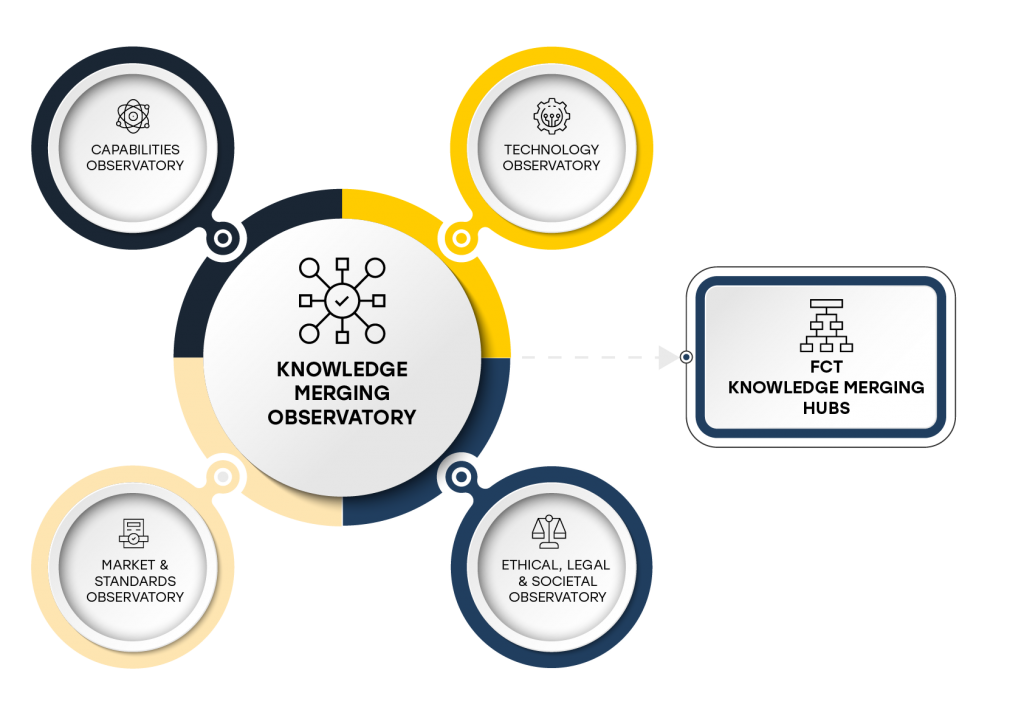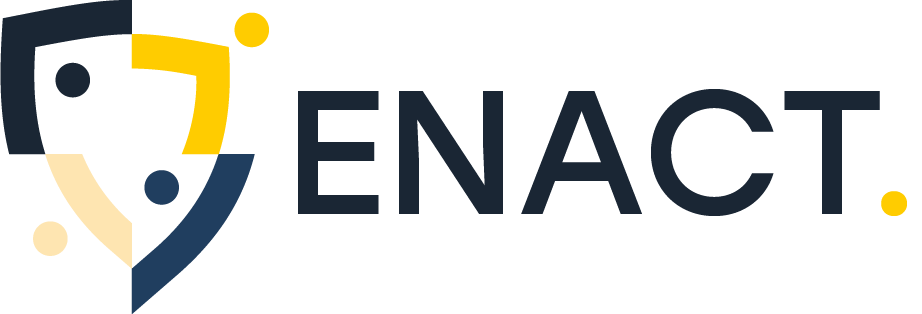
ABOUT
ENACT is a knowledge network focused on the fight against crime and terrorism (FCT). The network is funded under the Horizon Europe Framework Programme in Cluster 3 – Civil Security for Society. The project addresses the call topic HORIZON-CL3-2022-SSRI-01-02 ‘Knowledge Networks for Security Research & Innovation’, aiming to collect, aggregate, process, disseminate and make the most of the existing knowledge in the FCT area.
The project aims to satisfy two major ambitions,
- Provide evidence-based support to the decision-makers in the EU research and innovation (R&I) ecosystem in the FCT domain, targeted explicitly at enabling more effective and efficient programming of EU-funded R&I for the fight against crime and terrorism.
- Act as a catalyst for the uptake of innovation by enhancing the visibility and reliability of innovative FCT security solutions.
ENACT will channel all the resources available inside and outside the consortium and put them at the service of the FCT R&I community. To that end, ENACT’s activities aligned to the four pillars required for the successful operation of Knowledge Networks,
- Networking,
- Research,
- Communication, Dissemination and Exploitation (CDE), and
- Cooperation.
The project will bring these four pillars together in a robust, efficient and effective manner, leading to a model for the future sustainability of the ‘knowledge as a service’ approach proposed by ENACT.
Networking

Aim: Connect ENACT with the main Knowledge Hubs of the FCT R&I ecosystem.
Process: Through these hubs, ENACT will better structure, format and channel the knowledge needed and generated by the project from and to the main communities of interest.
Outcomes:
- Stakeholder Map
- Knowledge Hub Engagement Strategy

Key Knowledge Hubs for ENACT
Research

Aim: Establish five observatories to deliver feedback to the Knowledge Hubs.
Process: By cataloguing, aggregating and exploiting existing knowledge in the FCT area, ENACT will ensure the continuous availability of a structured knowledge base accessible to decision makers of the various R&I communities.
Outcomes:
- Structured knowledge base
- Periodic FCT capability, technology, market, ELS map.
- Flash knowledge reports
- Advanced research reports
The five observatories of ENACT.
- Capabilities: identified gaps and needs in the area of FCT.
- Technology: the current state-of-the-art including those (being) developed in EU-funded projects.
- Market and Standards: understanding the scope of the demand and supply, funding and standardization opportunities.
- Ethical, Legal and Societal: document the constraints and safeguards necessary for the FCT R&I community.
- Knowledge Merging Observatory: to integrate the outputs of all other observatories.

ENACT Research Pillar Process
- Acquire information from a range of sources.
- Classify and organize information according to the EU Security Market Study Taxonomy.
- Measure through the development of concrete metrics that can support investment and programming in security.
- Visualize information to maximize the value and clarify of collected insights.

Communication, Dissemination and Exploitation

Aim: Ensure the outcomes of ENACT reach the various stakeholders of the FCT community
Target Groups:
- Policymakers from DG Home and DG Connect, European Parliament and Member States.
- Law enforcement and wider community – Member State LEAs, EU Agencies, existing networks and working groups, forensics institutes.
- FCT R&I community – Universities, RTOs and Industry, relevant associations and initatives, EU-funded projects.
- General public and the media including civil society.

Exploitation

ENACT has a dual vision in its approach to exploitation.
- Ensure the results of the project are exploited by the FCT community for policy, programming and implementation.
- Enable organizations and projects to maximize the exploitation of their own results.
Cooperation

Aim: To interact, support and promote the providers of innovative solutions within the FCT R&I community.
Process: Engage with industry, academia and providers of innovative FCT solutions to support them to assess the feasibility of their findings, enhance the validation process, promote competitive development and dissemination of results.
Outcomes:
- End-user validation guidelines, reports and portfolio of solutions
- Pathway to market reports and studies.
ENACT’s cooperation plan focuses on improving the knowledge, the visibility, the supply, the reliability, validation and update of new security innovations using the following actions.
- Support to the winners of Security Innovation Awards
- Validation of FCT R&I results
- Participation and organization of FCT R&I events
- In-depth studies by external experts.

Sustainability
The vision for ENACT is to not only deliver the outcomes set out within the workplan but to ensure the sustainability of the Knowledge Network beyond the life of the project. ENACT calls this the ‘knowledge as a service’ model.
As part of the exploitaion of ENACT, the project will explore the options available to transfer the mechanisms and processes developed to other agencies or initiatives to sustain the provision of Security R&I knowledge.

Workplan
ENACT is a three-year project starting in September 2023. The project is divided into three cycles each made up of two phases.
- Ramp Up & Design Phase (M01 to M06): this phase implements all the activities required to put in place the mechanisms to manage te project and set up an operational knowledge network.
- Test Implementation Cycle (M07 to M12): this phase runs a test cycle to test and evaluate the implementation the ENACT observatories and other activities. This process will allow the consortium to fine tune the processes, tools and channels for effective project delivery whilst producing the first results.
- Implementation Cycle I (M13 to M24): this is the first full phase of network activities. The cycle will produce outputs at the halfway stage and at the conclusion of the cycle.
- Implementation Cycle II (M25 to M36): this is the second full phase of network activities continuing and extending the results achieved in Cycle I.
- Ramp Down (M31 – M36): this phase runs concurrently with the second half of Cycle II supporting the delivery of the final results and putting in place the mechanisms for the sustainability and legacy of the network.

Key Facts
Cluster: Civil Security for Society
Destination: Strengthened Security Research and Innovation
Topic ID: HORIZON-CL3-2022-SSRI-01-02
Topic Name: Knowledge Networks for Security Research & Innovation
Domain: Fight Against Crime and Terrorism
Action Type: Coordination and Support Action
Duration: 36 months
Budget: €1,912,974
Consortium: 12 partners from nine countries including five LEAs, two universities, three RTOs, one industry organization and one industrial association.

